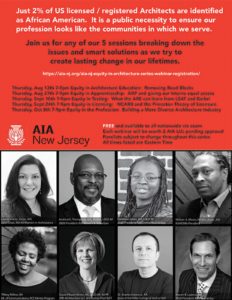August 11, 2020
Reading Time: 5 minutes
Join fellow AIA New Jersey members for this week’s webinar on the African American Experience Pursuing higher education in Architecture.
According to Architectural Record, the recent NCARB By the Numbers 2020 report, the ninth annual report released by the organization, offers a closer look at demographics and diversity.
The article by Mirian Sitz notes, “With more detailed demographic information available this year than in the past, the 2020 report showed that fewer than two in five architects are women, and fewer than one in five identifies as a racial or ethnic minority. Women in the profession are more diverse than men at every career stage, with over half who started down the road to licensure in 2019 identifying as a racial or ethnic minority. However, early in the path to licensure, the proportion of Black men starting the experience program exceeds that of Black women, 6 percent to 4 percent. This finding, especially when compared with data from the joint NOMA/NCARB survey conducted earlier this year, suggests “that there may be additional barriers preventing African American women from progressing in the profession,” says the NCARB report.
While NCARB and NOMA will continue to analyze the results of their joint survey—to which some 5,000 professionals replied in full—early results indicate “there is often slight, but widespread, disparity throughout the licensure process and in firm culture,” with women of color and Black professionals particularly affected.
Two-thirds of African American survey participants reported they could not identify leaders at their firm who are similar to themselves—a sentiment shared by only 26 percent of white respondents—and 40 percent said they have faced or witnessed discrimination in the workplace. Half of all people of color who were surveyed reported that they decided to stop pursuing licensure “while working at an architecture firm”—a proportion 7 percentage points higher than their white counterparts.
Given the disparities in work experiences, NCARB calls the higher level of attrition of people of color “understandable, and potentially preventable,” adding that such findings “highlight the need for culture and systematic shifts throughout the profession.”
In response to the slow increase in architectural professional diversity, new data and comments from academia, AIA New Jersey is opening up a 6 part panel discussion with key community members to look at the African American experience of the past and present and discuss strategies to make improvements for the future. The series has been developed and will be moderated by AIA New Jersey Women in Architecture Chair Libertad Lauren Harris, Associate AIA, in conjunction with the Equity in Architecture Committee. Registrants are invited to attend some or all of the webinars. This series is offered as a free member benefit to all.
What will it take for architectural courses being offered at our NJ Community colleges who offer Architectural programs to be upgraded so that their credits are acceptable to NJIT or some other accredited School of Architecture. NJIT is the only accredited architectural undergraduate school in NJ. Minorities and people of color who would like to transfer to an accredited school of Architecture are denied entry because their credits are not accepted. Many students do not realize this until they try to transfer. They will have to spend more money that they can ill afford and time taking additional courses in order to get approved. What can be done to make the students attending community colleges aware of their architectural education path forward and what is required to strengthen the curriculum at our Community Colleges?
Moderator
Confirmed Panelists
Are people of color getting the same opportunities to complete the AXP? NCARB statistics state that it takes people of color much longer to complete the AXP. Jon Stewart, famous comedian, stated he needed to leave his show to give equal opportunities to people of color because typically people hire from their intern base. If all your interns look like you, then you were not exposing your firm (or yourself) to anyone different than you.
YouTube Video on Jon Stewart’s comments on Internships https://www.youtube.com/watch?v=JVzZK2mLGi4
Moderator
Confirmed Panelists
It is theorized that having test question writers from only one population of people makes test-taking a roadblock for people of color. We will explore the LSAT lawsuit about accommodations and re-writing the questions. Also, what does Barbri get right about helping students whose English is a second language or people of color when it comes to helping people pass the Bar Exam.
Moderator
Confirmed Panelists
We will explore the comments from the Dean of Architecture at Princeton University and her theories that licensure is a roadblock to equity in the Architecture industry. We will explore ways to increase diversity at the leadership level of our licensing organizations and its effects on the lack of diversity of licensed architects.
Moderator
Confirmed Panelists
Outline: We will explore why many people of color receive their first break in an MBE or government entities where diversity is celebrated or required. We will explore the failures of private firms to achieve equity on their own terms. We will explore policies that AIA can put in place to encourage diversity. We will explore what equity is in real terms. What is the diversity of the community and the state, and what would/should a “good” representation look like. We will explore the salaries of people of color and how architecture has a real problem course correcting.
Moderator
Confirmed Panelists
By Stacey Ruhle Kliesch, AIA, AIA NJ Advocacy Consultant | Posted in Diversity, Uncategorized, Women in Architecture | Tagged: #ACEMentoringProgram, #AfricanAmerican, #ArchitecturalEducation, #diversity, #EDI, #equity, #Inclusion, #WIA, NOMA | Comments (0)
Architects are creative professionals, educated, trained, and experienced in the art and science of building design, and licensed to practice architecture. Their designs respond to client needs, wants and vision, protect public safety, provide economic value, are innovative, inspire and contribute positively to the community and the environment.

414 Riverview Plaza, Trenton, NJ 08611
(609) 393-5690
info@aia-nj.org